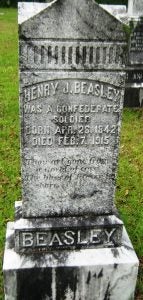Notes by Beasley recounts the Battle of Vicksburg
Published 5:00 am Wednesday, June 14, 2017
Story by Kevin McKinley | All Things Southern
The soldiers who enter a war do so for many reasons. Some have idealistic notions of fighting for abstract ideals or political ideology.
Others fight for their nation out of a sense of patriotism. Some fight because the enemy has invaded their homeland. Others fight because they are drafted.
Such was the story of Henry J. Beasley of the 23rd Alabama Infantry Regiment who lived in our area of Southwest Alabama. Forty-four years after the last armies surrendered in the field, around 1909, Beasley allowed his memories of the war to be recorded so that the truth about him and his fellow soldiers might be passed down to future generations.
He recounted the following:
“I was in Co. H of the 23rd and we went out in the autumn of 1861 and mustered into service at Montgomery, Ala., about Nov.16, 1861. Colonel F.K. Beck was our leader. From there we went to Dog River near Mobile.”
General Bragg, writing from Pensacola in November 1861 noted, “Colonel Beck’s regiment, already armed by private enterprise, is ordered to report to General Withers at Mobile.”
“From there we went up into Tennessee and Kentucky. We were under General Bragg in the Kentucky march.”
“It was a hard march, with but little to eat—parched and raw corn for several days—but we had a large quantity of bacon stored at camp. When we retreated it was fired and burned up. I saw the light of it for several miles, but we managed to get several pieces; so we had meat for several days. Some of the boys threw theirs away; and they were so worn out and footsore they could hardly march empty-handed.”
“We came through the gap of the Cumberland Mountains in the fall of 1862 and wintered in portions of Tennessee and Mississippi. In the early spring of 1863 we went to Vicksburg. While there we went for a day’s march up the Mississippi River and got lost in the swamps.”
“We were lost three days and nights and it rained the whole time we were there. We had nothing to eat while in the swamp. Our good Colonel Beck offered us his horse if we would eat him. We declined his generous offer and told him we would share the pangs of hunger with him. We all loved our officers, especially Colonel Beck. “
“On the day that we got out of the swamps the sun rose clear and bright. We knew Vicksburg was east of us so we marched in that direction. A short while after we started, we came in sight of a house.”
“I said to Ed Mock, “Here is where we can get something to eat.” So we stopped and they began preparing something to eat.”
“Ed soon became impatient and would not stay, so I was left to enjoy my fest alone. Yet I was not alone either, for there were two pretty girls, and this hungry “Reb” enjoyed himself immensely.”
“I remained with those good people and rejoined my command at Vicksburg about 11 o’clock that night and the boys had my rations drawed and cooked, so I happened to good luck at last.”
After this, the 23rd moved on to Port Gibson, Miss. The regiment played a pivotal role in that grueling battle on May 1, 1863, as Grant attempted to encircle Vicksburg. The men of the 23rd suffered great loses and suffered immense deprivations of spirit and body in the battle.
“We engaged in a hard battle,” wrote Beasley. “The boys fought well, but we had to fall back. Lost several, killed and wounded, some captured. E.W. Pettus of the 10th Alabama, was captured, but escaped by swimming.”
At the Battle of Big Black, Beasley wrote that the “fighting was desperate and the artillery roared all day long. The loss of life was terrible. We fell back to the trenches at Vicksburg where we remained for 40 days.”
All of the officers and men were heavily invested in the battle at Big Black. Captain A.C. Roberts’ mentioned in his report that Colonel Beck suffered a broken leg when he was kicked from his horse in the battle.
General Pemberton was in command at Vicksburg. The Union forces had the town surrounded on three sides by their large army and at sea by a flotilla of ironclads and gunboats. The battles in the trenches were sometimes face to face and other times the kill shot came from snipers a long distance away.
“We had a hard time at the siege of Vicksburg. We held them in check until we had nothing to eat and were in a famished condition.
“We surrendered on July 4, 1863. The Yankees were very kind to us; they gave us hungry “Rebs” plenty of rations, and we all came home on parole. After spending some days at home, we went to Demopolis in parole camps, and after the exchange we went to Tennessee,” noted Beasley.


